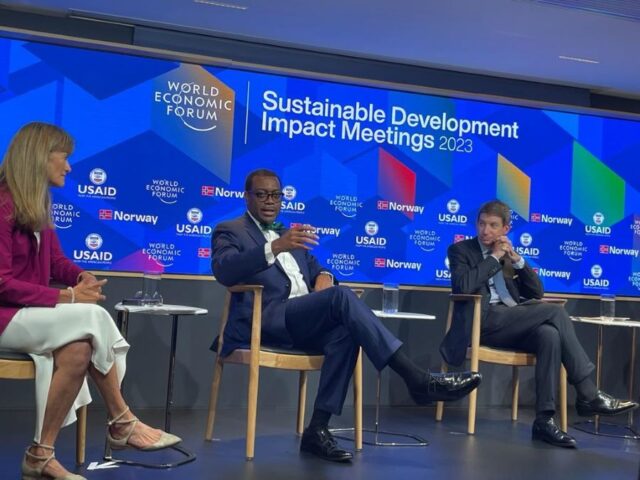
…Over half of global GDP – $44 trillion – depends on nature, emphasizing urgent need for nature-positive practices.
…Leading companies showcase seven proven strategies for a nature-positive and sustainable future, from sustainable forestry to circular economy innovations.
…The World Economic Forum’s new Spotlight on Nature report highlights how these practices are transforming business models and setting new standards.
MON SEPT 23 2024-theGBJournal| The World Economic Forum announces today the release of a new report highlighting how several companies are leading the transition to a nature-positive economy. With over half of the global GDP – approximately $44 trillion – reliant on nature, the report underscores the critical need for businesses to integrate nature-positive strategies into their operations.
This new analysis reveals seven pioneering approaches adopted by multinational businesses to address environmental challenges and seize new opportunities for sustainable growth.
Spotlight on Nature: Case Studies for Business Transformation towards a Nature-Positive Future, published in collaboration with McKinsey & Company, illustrates how businesses are implementing innovative and strategic practices, ranging from sustainable forestry and circular economy principles to advanced water stewardship and soil health initiatives.
The strategies, at the backbone of the companies’ operational structures, can scale up the achievement of Sustainable Development Goals SDG6 (Clean water and sanitation), SDG14 (Life below water) and SDG15 (Life on land). In this report, the World Economic Forum, with analytical support from McKinsey & Company, demonstrates how these companies are not only mitigating nature-related risks but also driving value within their operations.
“Businesses have a pivotal role in shaping the future of our planet,” said Gim Huay Neo, Managing Director, World Economic Forum. “Our latest report highlights concrete examples of how companies are taking action to protect, restore and sustainably manage natural resources, while driving profit and growth. This proactive approach is essential for addressing the interconnected challenges of nature loss, climate change, promoting livelihoods and sustainable development.”
The report features comprehensive case studies in various industries, highlighting how key players are pioneering nature-positive practices.
IKEA’s position as an affordable home furnishings supplier is closely tied to its ability to promote sustainable forestry. IKEA is pursuing a forest-positive business model by preventing deforestation and amplifying responsible forest management practices.
Walmart is committed to delivering sustainable, high-quality seafood at low prices and to secure a low-cost supply of seafood over the long term. Walmart is pursuing transparent seafood supply chains and advancing sustainable fishing practices.
Ørsted, as a renewable energy producer, addressing climate change and protecting biodiversity are interconnected objectives. As Ørsted develops offshore wind projects, it is mitigating the impact of its work on marine ecosystems by piloting site-specific initiatives to generate net-positive biodiversity outcomes.
Suntory, as a global beverage producer, water is not only its most essential ingredient but also a key input for its production processes. To secure a sustainable supply of freshwater resources, Suntory is pursuing efficiencies in water usage and investing in watershed replenishment.
AB InBev relies on clean water as both a key product ingredient and a necessary resource for suppliers of water-intensive input crops. To secure its supply of these product inputs, AB InBev is supporting local water resilience solutions in high-risk watersheds.
Yara, the global producer of fertilizers and agricultural solutions, partners with farmers to meet the world’s increasing demand for food. As agricultural production can put pressure on soil health, Yara is investing in long-term crop productivity by launching new technologies and products that support soil health for the long term.
Aditya Birla Group is a global conglomerate operating across 22 industry sectors and has created circular resource-use opportunities in its business. By repurposing waste outputs, the group has reduced its reliance on virgin materials and improved supply chain security.
“The business community’s efforts to adopt nature-positive practices are not only about compliance but about embedding new and innovative models that enable business resilience,” said Daniel Pacthod, Global Co-Leader, McKinsey & Company. “This report outlines several examples of how companies are working to make a difference and create value – which hopefully serves as an inspiration for others.”
Despite the promising strides showcased in the report, the journey towards a nature-positive economy is only just beginning. Significant challenges remain, from regulatory and financial barriers to logistical constraints, particularly in regions where policy frameworks and market incentives are still evolving.
What’s clear is that isolated efforts, however commendable, won’t be enough. The work these leading companies are doing marks an important step forward and many other businesses can learn from them on how to fully integrate nature-positive strategies into their operations. While early adopters are paving the way, widespread implementation is essential to drive meaningful impact.
As the 2030 deadline for the SDGs approaches, the World Economic Forum continues to emphasize the importance of collaborative action and innovation in driving the transition to a nature-positive economy.
The report calls for increased commitment from both the private and public sectors to adopt and scale sustainable practices that support global biodiversity and climate goals.
The Sustainable Development Impact Meetings 2024 are being held from 23-27 September in New York. Over 1,000 global leaders from diverse sectors and geographies will come together to assess and renew global action around the United Nations Sustainable Development Goals through a series of impact-oriented multistakeholder dialogues.
The meetings are an integral part of the Forum’s year- round work on sustainable development and its progress.
X-@theGBJournal|Facebook-the Government and Business Journal|email:gbj@govbusinessjournal.com|govandbusinessj@gmail.com









